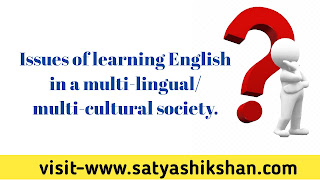Issues of learning English in a multi-lingual/multi-cultural society.
Q. Issues of learning English in a multi-lingual/multi-cultural society.
Ans. A multilingual/multicultural society is one with a mix of people from various cultural groups that speak different languages. In a multi-lingual/multi-cultural country like India, where very few people speak English as their mother tongue, and the majority of the people learn English as their second or third language, there exists certain issues in learning the language i.e. English. Some of such issues are as follows.
i. In a class for learning a second language, a teacher has to choose materials that match the linguistic and cognitive levels of children. Serious problems may arise, If children do not understand the basic meaning of the text they are studying. They may loose interest in learning the language because of hard vocabulary or grammar. Preparing materials that may meet such issues itself becomes very much challenging for a teacher in a classroom of a multilingual/multi-cultural society.
ii. In a learner or learning centred classroom, a teacher has to keep in mind the interest, abilities and knowledge level of the learners before going to teach a language. But, as the teacher has to handle children from a vast diversity of backgrounds and with a varying level of proficiency, the teaching-learning process do not prove to be completely fruitful.
iii. In a normal classroom of a multilingual/multi-cultural society, where all the students may not have any common language to interact with each other, it will be difficult for them to talk with the peers or turn to each other to clarify a grammatical point or define a vocab word in their mother tongue. As all the communication, in such situation, has to be in the common language, i.e. English, it becomes a challeng for the learners to learn it. As the students do not have a common language, they are very likely to lose interest soon and the whole exercise may prove fruitless.
iv. All the students in a monolingual classroom, usually, make the same mistakes. For example, a classroom of Chinese students may all struggle with the “r” sound in English, so they understand their classmate when he mispronounces words with “r.” In a classromm of multilingual/multicultural society the mistakes will of different types and that may sometimes make the learning process disappointing or confusing.
v. Learning styles in students can differ from one culture to the next, too. So, in order to make learning English effective a teacher may have to make small groups of students to ensure their active participation and a positive outcome.
vi. Student in a multilingual/multicultural society speak different languages with different pronunciation, stress, intonation etc. which have adverse affect in learning English. As for example, an Assamese student may pronounce the /ch/ sound as "চ'' not as "च" and so on that makes the learning process challenging.
vii. In a multilingual/multicultural society, a teacher has to be multilingual who has democratic feelings saturated with sense of respect to the varied traditions and cultures of the multicultural society. Lack of such teachers make the learning of English in a multilingual/multicultural society problemsome, as only a multilingual teacher can understand the problems of the students of such societies and draw solutions out for it.
Conclusion - In a class room of a monolingual/mono-cultural society, all the students, usually make the same mistakes and so their mistakes may stay unheard, - unnoticed. But in a multilingual/multicultural classroom mistakes of a student belonging to a particular language and culture group is understood by an another language and culture group. Hence, it is noticed and gets way for improvement and makes multilingula/multicultural classroom a boon for learning English provided the teacher is well-trained and an ideal speaker of the English language.
(Prepared by Satyajeet Saikia)



Comments
Post a Comment
Thanks for your response.